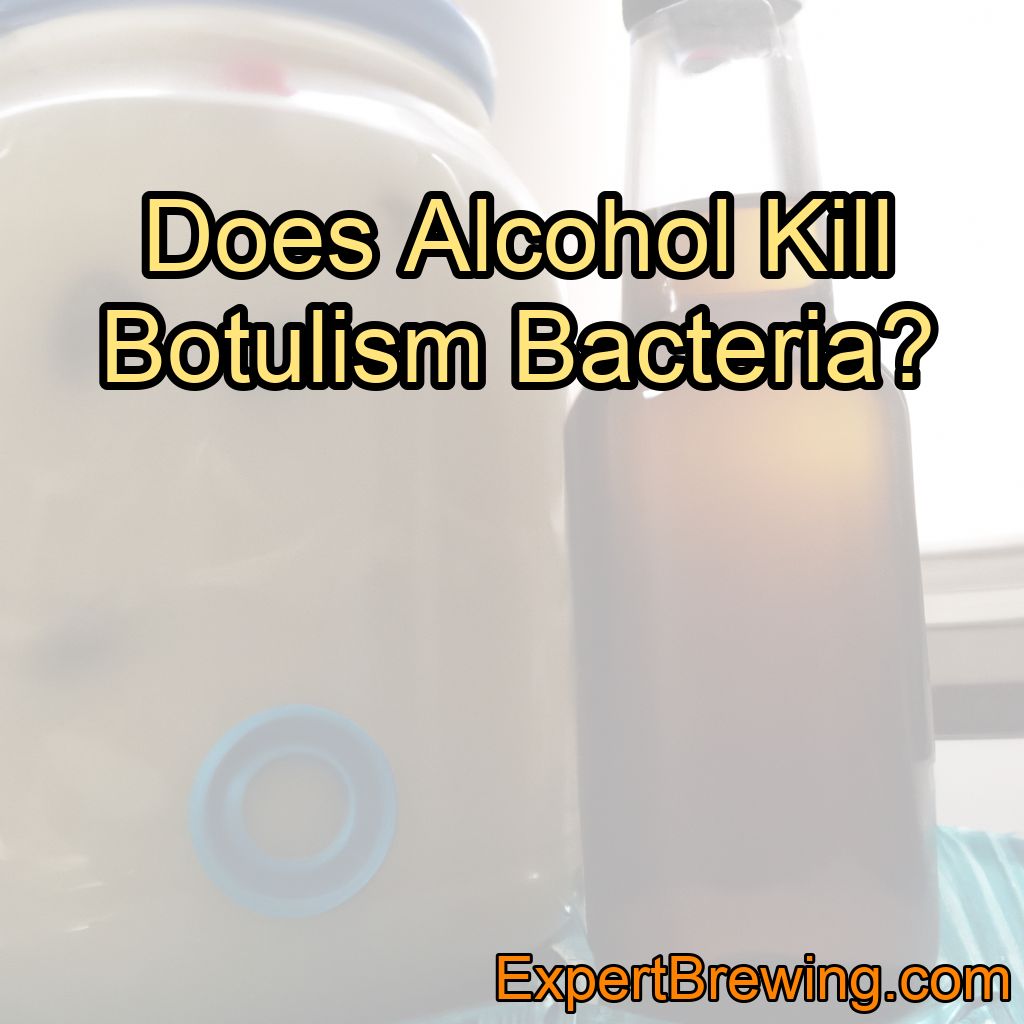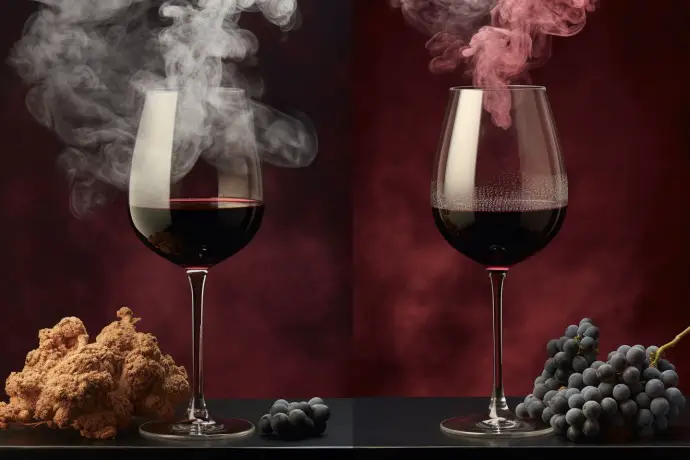From a young age, I learned that alcohol has numerous benefits and uses aside from being a social lubricant.
It can be used as a disinfectant, a fuel source, and even a preservative. With such versatility, it’s only natural to wonder if alcohol can kill certain harmful bacteria, such as the one that produces the deadly botulinum toxin.
When brewing, which takes place under anaerobic conditions (without oxygen) it is relevant to be concerned with Clostridium botulinum bacteria as they can survive even the toughest conditions.
Especially when brewing mead (from honey) one should be concerned as clostridium spores are often found in honey to begin with (that’s why you can’t feed it to babies btw…).
Well, back to the question!
In this article, we will explore the relationship between alcohol and botulism bacteria, and answer the main question: does alcohol kill botulism bacteria?
Alcohol does not kill all botulism bacteria, but they cannot grow in alcohol either.
Upon experiencing stress, they can form alcohol resistant spores that hatch when the alcohol is gone (e.g. when they reach your gut!).
Alcohol will inhibit the growth of clostridium botulinum bacteria, but it does not destroy the botulinum toxin or kill the bacteria that produces it.
Now that we have our answer, let’s dive deeper into this topic and learn more about botulism, alcohol, and other ways to kill botulism bacteria!
What is Botulism?
Botulism is a rare but potentially fatal illness caused by the botulinum toxin, which is produced by the bacterium Clostridium botulinum.
There are various forms of botulism, including foodborne, wound, and infant botulism. The botulinum toxin is one of the most potent neurotoxins known and can cause muscle paralysis, respiratory failure, and even death.
Food (or drink!)-borne Botulism
Foodborne botulism is caused by consuming food contaminated with the botulinum toxin.
This typically occurs in low-oxygen environments, such as canned foods, honey, smoked fish, or vacuum-packed meats.
The bacteria can grow and produce the toxin in these environments, which can then be ingested by humans.
The risk of botulism when brewing
While botulism is typically associated with improperly canned or preserved food, it is also a risk in brewing, particularly in homebrewing and craft brewing. This is because Clostridium botulinum can thrive in low-oxygen, low-acid environments, such as those found in certain types of beer and wine.
One way that botulism can occur in brewing is through the use of contaminated ingredients. For example, if the malted barley or other grains used in brewing are contaminated with Clostridium botulinum spores, these spores can survive the brewing process and produce toxins in the finished beer.
Similarly, if the water used in brewing is contaminated with the bacteria, it can lead to botulism in the finished product.
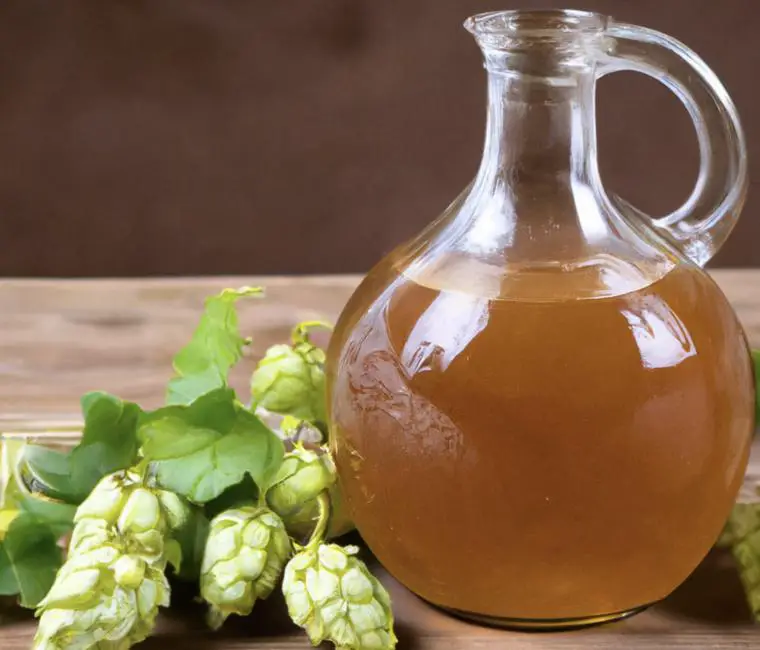
Another way that botulism can occur in brewing is through improper storage and handling of the finished beer, cider or mead.
If the brew is not stored properly (too warm) and not allowed to ferment completely (low alcohol), it can create the low-oxygen, low-acid environment that Clostridium botulinum needs to thrive.
Additionally, if the beer is not pasteurized or bottled under unhygienic conditions, it can become contaminated with the bacteria that produce the toxins.
To reduce the risk of botulism in brewing, it is important to use clean, high-quality ingredients and to follow proper sanitation and sterilization procedures before and after the brewing process.
It is also important to properly store and handle the finished beer, including properly bottling and sealing it.
In addition, it is recommended that brewers avoid using certain types of ingredients that are particularly high-risk for botulism, such as those that have been in contact with soil and e.g. wash hop flowers used for dry hopping properly to get rid of potential Clostridium botulinum spores.
Overall, while the risk of botulism in brewing is relatively low, it is still a serious concern that should not be ignored.
By following proper brewing practices and taking steps to reduce the risk of contamination, brewers can help ensure that their beer is safe to drink and free from harmful bacteria and toxins.
Mead brewing as a special concern
Mead, a fermented beverage made from honey and water, can carry a risk of botulism if the honey used contains botulinum spores. These spores can survive the fermentation process and can grow and produce toxin under certain conditions, such as in low-oxygen environments like sealed bottles or fermentation jars.

While the risk of botulism in mead is relatively low, it is still important to take precautions to minimize the risk.
One way to do this is to use only high-quality honey from reputable sources, as this is less likely to contain botulinum spores.
It is also important to follow good brewing practices, including proper sanitation and hygiene, and to carefully monitor the fermentation process to ensure that the mead is not exposed to conditions that could encourage the growth of botulinum bacteria.
In addition, it is important to store and handle mead carefully, especially if it has been bottled or packaged in a way that could create a low-oxygen environment. Mead should be kept cold and consumed within a reasonable timeframe to minimize the risk of botulism.
Overall, while the risk of botulism in mead is real, it can be minimized through careful brewing practices and proper handling and storage.
As with any food or drink, it is important to be aware of the potential risks and take appropriate precautions to ensure that the mead is safe to consume.
The Effects of Alcohol on Botulism Bacteria
Alcohol, particularly ethanol, is known for its antibacterial properties. However, the effectiveness of alcohol as a disinfectant depends on its concentration, the type of bacteria, and the duration of exposure.
Alcohol Concentration
The concentration of alcohol is essential in determining its effectiveness in killing bacteria.
Generally, alcohol solutions containing 60-90% alcohol are considered most effective in killing bacteria when used as a sanitiser.
Higher is not always better as the water keeps the alcohol from evaporating, giving it time to kill the microbes!
However, when it comes to brewing, beer or mead with lower alcohol concentrations (< 8%) there is a real chance of clostridia bacteria surviving. At least long enough to form spores!
In brewing, very high alcohol concentrations are not achievable as even the most tolerant yeasts do not go much above 20% before giving up.
How much alcohol does it take to kill Botulism bacteria?
So, how do bacteria – specifically our friend (enemy…) C. botulinum do in smaller concentration of alcohol?
Heres a graph showing the growth rate (how fast it multiplies) at different alcohol concentrations:
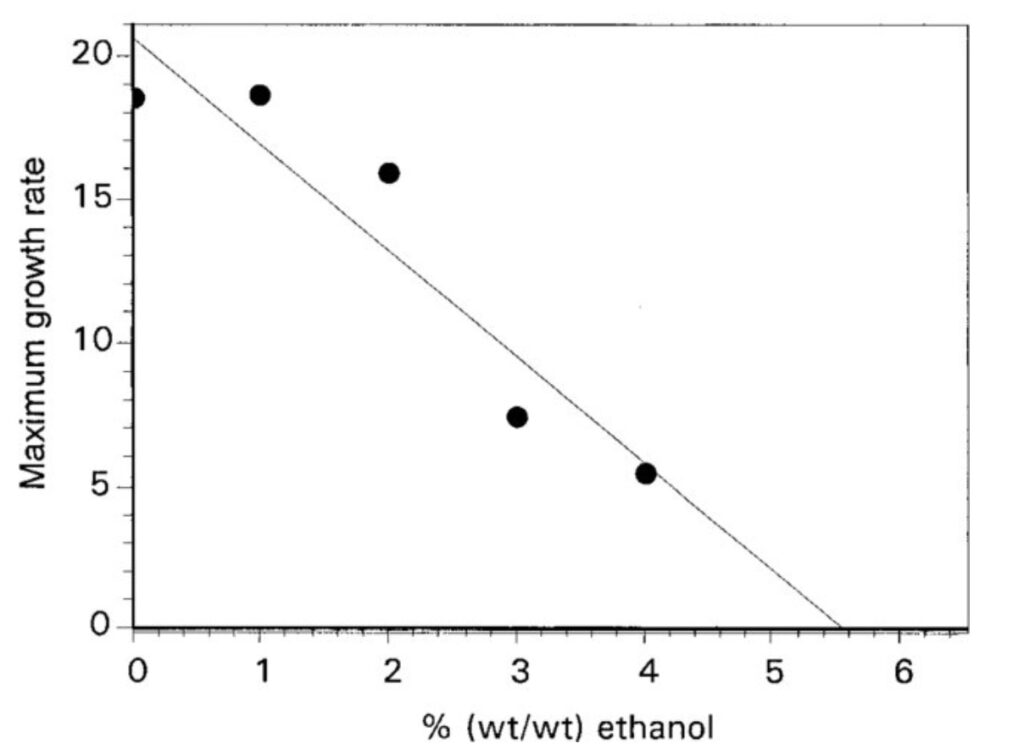
This does not, however, mean that you get completely rid of clostridium at 6% alcohol (unfortunately!), because their spores can live on in much higher (>90%) alcohol concentrations.
For most adults with a functioning immune system (and intact gut microbiome…) this is not a problem as these spores will never have a chance to hatch and produce enough toxin.
If, however, you were to boil the alcohol out of your beer, mead or cider and leave it standing at room temperature in a sealed (anaerobic) bottle, these spores might hatch and produce the botulism toxin again!
Duration of Exposure matters!
The length of time alcohol is in contact with bacteria also plays a role in its effectiveness. A longer exposure time increases the chances of killing the bacteria, but it may not always be practical, especially when using alcohol as a hand sanitizer or surface disinfectant.
Types of Bacteria and alcohol susceptibility
Different types of bacteria have varying levels of susceptibility to alcohol. Gram-positive bacteria, such as Staphylococcus and Streptococcus, are more susceptible to alcohol than gram-negative bacteria like Escherichia coli and Salmonella.
This is due to differences in their cell walls, which affect how easily alcohol can penetrate and kill the bacteria.
Here is a table showing the minimum alcohol % needed to stop the growth of some common bacteria:
| Bacteria | Alcohol Tolerance (Max %) |
|---|---|
| Escherichia coli | 8-10% |
| Salmonella spp. | 8-10% |
| Pseudomonas aeruginosa | 10-12% |
| Staphylococcus aureus | 3-5% |
| Streptococcus pyogenes | 4-6% |
| Clostridium botulinum | 5-7% (Spores >90%) |
| Bacillus subtilis | 12-15% (Spores >90%) |
| Lactobacillus spp. | 15-20% |
| Saccharomyces cerevisiae (yeast) | 10-15% |
Alcohol as a Preservative
Alcohol has been used for centuries as a preservative in various food and drinks, such as spirits, liqueurs, and tinctures.
The high alcohol content in these products helps to inhibit the growth of bacteria and other microorganisms, thus extending their shelf life.
However, as mentioned earlier, alcohol does not kill botulism bacteria or destroy the botulinum toxin.
Preventing Botulism in Brewing by Oxygen exposure!
Strict anaerobes like Clostridium are microorganisms that require an oxygen-free environment to grow and thrive.
For strict anaerobic bacteria like C. botulinum, oxygen is a potent toxin that will kill them after prolonged (> 20min) exposure!
In brewing, we don’t normally recommend oxygen as it inhibits fermentation, but it does in fact benefit the growth of yeas before fermentation, so it is important to oxygenate your wort or juice before sealing it airtight for the rest of the process.
One way to do this is by thoroughly oxygenating the “raw” ingredients (mash, juice, diluted honey) just before fermentation.
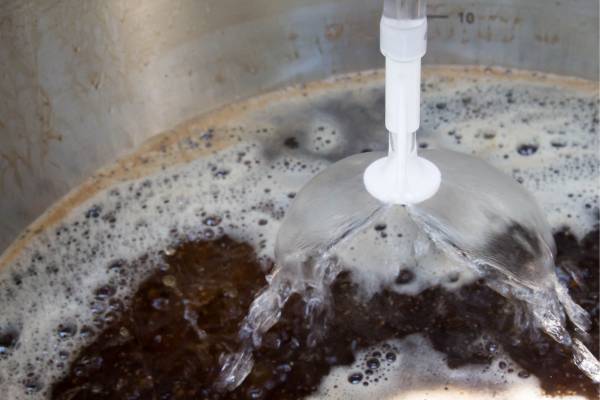
Oxygenation of the raw ingredients, such as the fruit juice or honey used in brewing, involves adding oxygen to the mixture to kill strict anaerobes like C. botulinum but also by encouraging the growth of aerobic microorganisms such as yeast and bacteria, which require oxygen to grow.
By increasing the number of aerobic microorganisms, the risk of growth of strict anaerobes such as Clostridium is also reduced.
When the mixture is oxygenated, the yeast and bacteria consume the oxygen and produce carbon dioxide and other byproducts that create an environment that is unfavorable for the growth of strict anaerobes.
The increased number of aerobic microorganisms also means that they consume the available nutrients in the mixture, leaving less for the strict anaerobes to use.
Overall, thorough oxygenation of raw ingredients in brewing can help to create a more favorable environment for aerobic microorganisms, which can outcompete and prevent the growth of strict anaerobes such as Clostridium.
This can lead to a healthier fermentation process and a final product with fewer spoilage issues and off-flavors.
One way to increase oxygenation later in the brewing process is by doing frequent racking of your brew to expose it momentarily to oxygen.
Conclusion
In conclusion, alcohol does not kill botulism bacteria or destroy the botulinum toxin. While alcohol can inhibit the growth of many types of bacteria, it is not effective against Clostridium botulinum or its spores. The best way to prevent botulism is through proper food handling, storage, and preparation practices.
To recap, here are 10 facts about alcohol and botulism bacteria:
1. Alcohol does not completely kill botulism bacteria due to their spore formation.
2. Alcohol does not destroy the botulinum toxin either.
3. Botulism is caused by the botulinum toxin produced by Clostridium botulinum bacteria.
4. There are various forms of botulism, including foodborne, wound, and infant botulism.
5. Alcohol can inhibit the growth of many types of bacteria but is not effective against Clostridium botulinum or its spores.
6. Alcohol’s effectiveness as a disinfectant depends on its concentration, the type of bacteria, and the duration of exposure.
7. Home canning can be a source of botulism if not done correctly.
8. Pressure cookers should be used when canning low-acid foods to kill botulism bacteria and their spores.
9. Acidifying canned foods can help prevent botulism by inhibiting the growth of Clostridium botulinum bacteria.
10. Preventing botulism involves proper food handling, storage, and preparation practices.
FAQs
How much alcohol does it take to kill botulism?
It takes >6% alcohol to kill live botulism bacteria but alcohol cannot kill botulism bacteria spores. Botulism is caused by a toxin produced by the bacteria Clostridium botulinum, which can only be destroyed by high temperatures (boiling for at least 10 minutes) or through the use of specialized antitoxins.
How do you kill botulism bacteria?
Botulism bacteria can be killed by thoroughly aerating your food/drink or heating food to a temperature of 85°C for at least 5 minutes or by boiling it for 10-20 minutes. It is important to follow proper food handling and storage practices to prevent the growth of botulism bacteria in the first place.
How do you kill botulism on surfaces?
Botulism spores can be killed on surfaces by using a solution of 1 tablespoon of bleach per gallon of water or by using a commercial disinfectant containing hydrogen peroxide. It is important to thoroughly clean the surface before using the disinfectant to ensure effective killing of the spores.
Does alcohol kill botulism on surfaces?
No, alcohol does not reliably kill botulism on surfaces. Botulism spores can survive in alcohol and require high heat or pressure to be destroyed. It is recommended to use a bleach solution or other disinfectant specifically labeled for killing botulism spores.
What disinfectant kills botulism?
There is no specific disinfectant that is known to kill botulism spores. The best way to prevent botulism is through proper food handling and storage practices.
Can Clostridium botulinum survive disinfectant?
Clostridium botulinum can survive some disinfectants, but not all. The spores of this bacterium are highly resistant to many disinfectants, including alcohol and some common household cleaners. Therefore, it is important to use disinfectants that are specifically designed to kill Clostridium botulinum spores, such as those containing chlorine or hydrogen peroxide. It is also important to follow the manufacturer’s instructions and use the disinfectant for the recommended amount of time to ensure complete disinfection.

